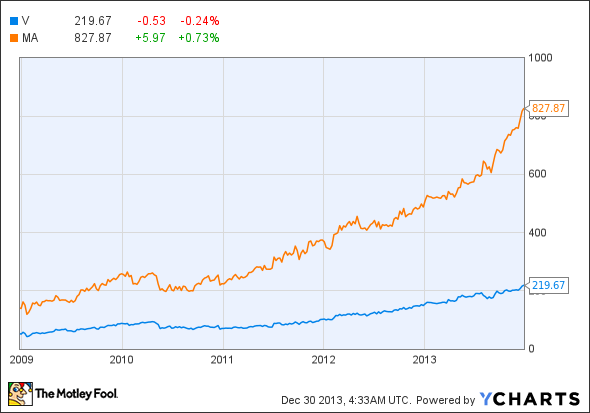Filed under: Investing
In 2005, trade groups and merchants sued Visa and MasterCard over exorbitant credit card transaction fees, alleging that the two companies were price fixing. Also referred to as swipe or interchange fees, transaction fees get tacked on to what you pay in exchange for allowing merchants to accept debit or credit card payments. Online retailers are particularly vulnerable to the fee structure as many online payments are conducted with debit or credit cards.
Both Visa and MasterCard are happy with the settlement
The suit started at $7.25 billion and then dwindled down to $5.7 billion as some retailers bowed out of the deal. The settlement allows Visa and MasterCard to put the case behind them. Evidently the market thinks that's a good idea, as the stock prices for Visa and MasterCard have increased over 5% since the announcement was made on Dec. 13.
The settlement will also allow merchants to charge extra if customers use MasterCard or Visa -- a practice known as surcharging. Surcharging allows the merchant to pass the transaction fee directly on to the consumer, effectively giving the consumer a "choice" of whether or not to accept the fee.
This added transparency is akin to the "choice" airlines give you for checking large baggage -- if you have a large bag it needs to be checked. The perception of choice is an illusion, and smart shoppers know this. Likewise, merchants that charge a fee for using Visa may end up losing market share in an increasingly competitive marketplace with an increasingly smarter customer base.
So, while charging surcharges allows retailers an opportunity to recoup costs from customers there are some obvious drawbacks -- namely, the loss of market share. Additionally, surcharges are illegal in the states of California, Colorado, Connecticut, Florida, Kansas, Maine, Massachusetts, New York, Oklahoma, and Texas.
Not everyone likes the settlement
The National Association of Convenience Stores, the National Community Pharmacists Association, and the National Retail Federation (NRF) are all against the settlement. The NRF describes the settlement as "deeply flawed," and NRF President and CEO Mathew Shay said, "It does nothing to curb the anti-competitive behavior of Visa and MasterCard."
Among the largest retailers against the settlement are Target., Macy's, Amazon, and Wal-Mart. All four rejected the initial settlement offer last year on the basis that it did nothing to protect them against price fixing and forced merchants to waive the right to sue over swipe fees in the future.
The cost to retailers and the effect on margins may be significant
According to the National Association of Retailers, the annual tab paid by retailers for transaction fees is $30 billion. These fees, which average around 2% of the purchase price, eventually find their way to the consumer in the form of higher prices and to merchants in the form of higher costs and lower margins.
There's a great deal of competition in the retail space, and merchants are desperate for earnings. Companies like Big Lots and Tuesday Morning posted negative earnings this quarter, and Target has been in earnings decline since the beginning of 2013.
BIG EPS Diluted (TTM) data by YCharts
For these companies, lower fees represent a real opportunity to put a permanent dent in the cost of sales and provide a much-needed boost to earnings.
The Foolish bottom line: competition is a good thing
Anything that levels the playing field for increased competition is good for investors. Judge John Gleeson, the presiding judge over the case, said the settlement has the "potential to unleash a new competitive force on interchange fees." This settlement should translate into higher margins for retailers, but if it doesn't then Wal-Mart and Target will probably be back in court with Visa and MasterCard in the very near future. There are simply too many dollars at stake for them to do otherwise.
So what happens to Wal-Mart now?
To learn about two retailers with especially good prospects, take a look at The Motley Fool's special free report: "The Death of Wal-Mart: The Real Cash Kings Changing the Face of Retail." In it, you'll see how these two cash kings are able to consistently outperform and how they're planning to ride the waves of retail's changing tide. You can access it by clicking here.
The article Visa and MasterCard Ordered to Pay $5.7 Billion Settlement originally appeared on Fool.com.
Fool contributor C Bryant has no position in any stocks mentioned. The Motley Fool recommends MasterCard and Visa. The Motley Fool owns shares of MasterCard and Visa. Try any of our Foolish newsletter services free for 30 days. We Fools may not all hold the same opinions, but we all believe that considering a diverse range of insights makes us better investors. The Motley Fool has a disclosure policy.Copyright © 1995 - 2014 The Motley Fool, LLC. All rights reserved. The Motley Fool has a disclosure policy.
Read | Permalink | Email this | Linking Blogs | Comments





















